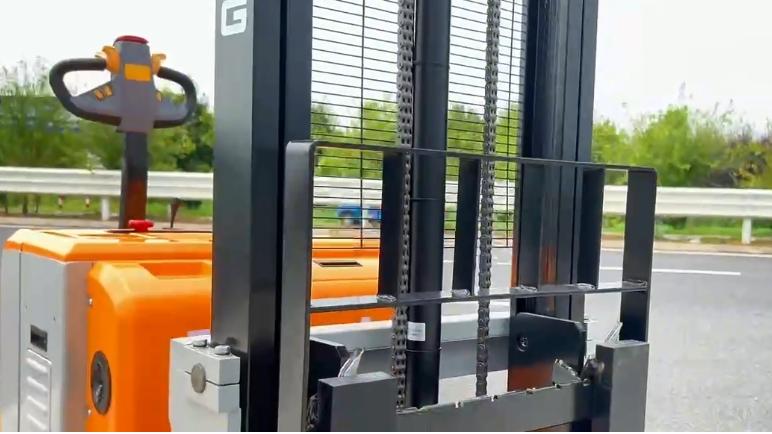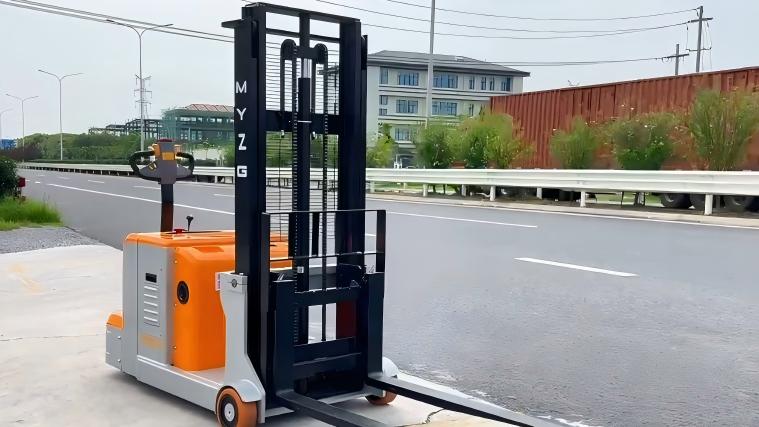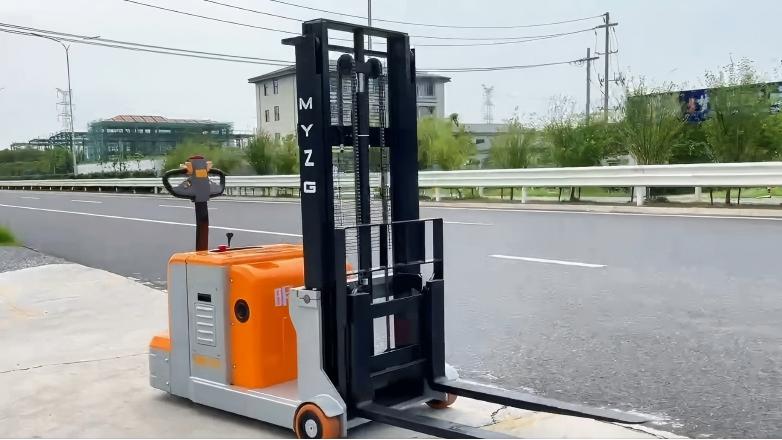Are Lithium-Ion Batteries Better Than Lead-Acid for Electric Pallet Jacks?
1. Introduction
Electric pallet jacks are essential pieces of equipment in warehouses, distribution centers, and manufacturing plants. They help in efficiently moving pallets of goods, improving productivity, and reducing the physical strain on workers. However, the performance and overall efficiency of these electric pallet jacks are largely determined by the type of battery powering them.
Two common battery types used in electric pallet jacks are lithium-ion (Li-ion) and lead-acid batteries. Both have distinct advantages and disadvantages that can affect the operational costs, performance, and longevity of the equipment. This article seeks to answer the question: Are lithium-ion batteries better than lead-acid for electric pallet jacks?
By comparing their performance, cost-effectiveness, maintenance requirements, and environmental impact, we aim to determine which battery type is more suitable for different operational environments and offer recommendations for businesses looking to make an informed decision.
2. Understanding Lithium-Ion and Lead-Acid Batteries
Lithium-Ion Batteries
Lithium-ion batteries have gained widespread popularity across various industries due to their advanced technology and impressive performance characteristics. They are commonly used in electric vehicles, consumer electronics, and increasingly in material handling equipment such as electric pallet jacks. The key features of lithium-ion batteries include:
High Energy Density: Lithium-ion batteries store more energy in a smaller and lighter package compared to lead-acid batteries. This allows electric pallet jacks to run longer on a single charge and carry more weight.
Fast Charging: These batteries charge significantly faster than lead-acid batteries, enabling short downtime between operations.
Long Lifespan: Lithium-ion batteries have a longer cycle life, lasting between 3,000 to 5,000 charge cycles compared to lead-acid’s 500 to 1,000 cycles.
Low Maintenance: Unlike lead-acid batteries, lithium-ion batteries do not require frequent maintenance, such as watering or cleaning.
Lead-Acid Batteries
Lead-acid batteries are the traditional battery choice for electric pallet jacks. They have been around for over a century and are well-established in industrial applications. These batteries are:
Lower Initial Cost: Lead-acid batteries are less expensive to purchase upfront than lithium-ion batteries, making them an attractive option for budget-conscious buyers.
Established Technology: They have a proven track record for reliability in a variety of material handling equipment, with widespread industry familiarity.
Heavier and Bulkier: Lead-acid batteries are much heavier and bulkier than lithium-ion batteries, reducing the overall maneuverability of electric pallet jacks.
Regular Maintenance Required: They require routine maintenance, including checking water levels and cleaning terminals to prevent corrosion.
3. Performance Comparison
Efficiency and Power
When it comes to efficiency, lithium-ion batteries outperform lead-acid batteries significantly. Lithium-ion batteries have a higher energy density, meaning they can provide more power in a smaller and lighter package. This translates into a longer runtime, allowing pallet jacks to operate for extended hours without needing a recharge.
In comparison, lead-acid batteries, although reliable, tend to be bulkier and less efficient. They have a lower energy density, meaning they need to be larger and heavier to achieve similar power output. This makes electric pallet jacks with lead-acid batteries less efficient and often limits their operating time.
Charging Time and Convenience
Lithium-ion batteries excel in terms of charging time. They can be charged much faster than lead-acid batteries, often achieving an 80% charge in as little as one hour. This allows operators to take advantage of "opportunity charging" during breaks, leading to less downtime and greater productivity.
Lead-acid batteries, on the other hand, take much longer to charge. A typical charge cycle can take up to 8 hours, and the battery must be allowed to cool down before recharging. Additionally, lead-acid batteries cannot be charged in partial cycles as efficiently as lithium-ion batteries, making their overall charging process less flexible.
Energy Density
The energy density of a battery determines how much power it can store relative to its size and weight. Lithium-ion batteries have significantly higher energy density than lead-acid batteries, which means they can store more power without adding excess weight or bulk. This makes lithium-ion a better choice for operations requiring a high energy output with limited space, such as electric pallet jacks used in fast-paced or large-scale warehouses.
Battery Lifespan
Lithium-ion batteries typically last longer than lead-acid batteries. While a lead-acid battery might last between 500 to 1,000 charge cycles, a lithium-ion battery can last anywhere between 3,000 to 5,000 cycles. This difference in lifespan translates into fewer replacements over time, which significantly lowers the total cost of ownership.
4. Cost Comparison
Upfront Costs
The most significant difference between lithium-ion and lead-acid batteries is the upfront cost. Lead-acid batteries are typically 30% to 50% cheaper than lithium-ion batteries. This makes them a more affordable option for businesses with tight budgets or for those who need to equip a large fleet of electric pallet jacks.
However, while the initial investment in lead-acid batteries is lower, the long-term costs are often higher due to maintenance, shorter lifespan, and less energy efficiency.
Total Cost of Ownership
When considering the total cost of ownership (TCO), lithium-ion batteries have a clear advantage. Though they come with a higher upfront cost, their longer lifespan, lower maintenance needs, and better energy efficiency lead to lower operational costs over time. Businesses can expect a higher return on investment (ROI) when using lithium-ion batteries.
In contrast, lead-acid batteries require frequent maintenance, including watering and cleaning, and they need to be replaced more often. Over a 5- to 7-year period, the TCO of lead-acid batteries can far exceed that of lithium-ion batteries.
Return on Investment (ROI)
Lithium-ion batteries offer a better ROI due to their longer lifespan, reduced maintenance, and overall higher efficiency. For businesses that plan to use their pallet jacks for several years, lithium-ion batteries can deliver significant savings in the long term, even though the initial cost is higher.
5. Maintenance and Durability
Maintenance Requirements
Lead-acid batteries require regular maintenance to function efficiently. This includes checking and maintaining proper water levels, cleaning the terminals, and ensuring the battery is correctly charged. Without proper maintenance, lead-acid batteries can suffer from shortened lifespans, reduced performance, and potential leakage.
On the other hand, lithium-ion batteries require little to no maintenance. They are sealed units that do not need to be watered, cleaned, or monitored regularly. This reduced maintenance burden is one of the primary reasons many businesses opt for lithium-ion batteries despite the higher upfront costs.
Durability
Lithium-ion batteries are known for their durability, withstanding deep discharge cycles and extreme temperature variations better than lead-acid batteries. They also have a greater resistance to damage from vibrations, making them ideal for the rough environments typical in warehouses and industrial settings.
Lead-acid batteries, while durable, are more susceptible to issues like corrosion and sulfation, particularly when not maintained properly. They are also less resistant to temperature fluctuations, which can affect their performance and lifespan.
6. Environmental Impact
Recyclability and Sustainability
In terms of environmental impact, lithium-ion batteries are more eco-friendly in the long run. They have a higher energy efficiency and are easier to recycle compared to lead-acid batteries. While lithium-ion battery production does have an environmental footprint, the overall energy savings and lower emissions over their lifetime make them a more sustainable option.
Lead-acid batteries, on the other hand, contain harmful substances like lead and sulfuric acid, which can pose environmental risks if not disposed of properly. Recycling lead-acid batteries is more complex, and the process can generate significant waste.
Energy Efficiency
Lithium-ion batteries are generally more energy-efficient, meaning they convert a higher percentage of energy into usable power, reducing the overall environmental impact. This contributes to a smaller carbon footprint in businesses using electric pallet jacks powered by lithium-ion batteries.
7. Safety Considerations
Risk of Battery Failure
Lead-acid batteries have a greater risk of leakage, especially when they are not maintained properly. This can cause damage to the surrounding equipment or pose safety hazards to workers. In addition, lead-acid batteries vent hydrogen gas during charging, which can be hazardous if not properly ventilated.
Lithium-ion batteries have a lower risk of leakage and gas venting, though they are not without safety concerns. Improper charging or physical damage to the battery can lead to thermal runaway, which can cause a fire or explosion. However, modern lithium-ion batteries have built-in safety mechanisms to prevent such incidents.
Handling and Safety Protocols
Both types of batteries require proper handling and safety protocols. However, lithium-ion batteries typically require fewer precautions in daily operations compared to lead-acid batteries, making them easier and safer to use in busy warehouse environments.
8. Suitability for Different Warehouse Operations
High-Intensity Use
Lithium-ion batteries are better suited for high-intensity warehouse operations that require long runtime, quick charging, and minimal downtime. Their long lifespan and ability to handle continuous use without needing significant maintenance make them an ideal choice for businesses with large fleets of electric pallet jacks used throughout the day.
Low-Intensity Use
For businesses with lower operational demands or limited budgets, lead-acid batteries may still be a viable option. While they are less efficient and require more maintenance, their lower upfront costs make them more accessible for smaller operations with limited use cases.
Fleet Size and Utilization
Larger fleets or those in high-turnover industries will benefit more from lithium-ion batteries, as the reduced maintenance needs and energy efficiency can result in significant cost savings. For smaller fleets, however, lead-acid batteries may still be an attractive option, especially when working with tight budgets.
9. Market Trends and Adoption
Industry Shift Towards Lithium-Ion
There is a clear industry trend toward adopting lithium-ion batteries in material handling equipment. As technology improves and costs decrease, more companies are making the transition from lead-acid to lithium-ion batteries. Many industries are adopting lithium-ion for their superior performance, longer lifespan, and lower TCO.
Challenges of Transitioning
While the benefits of lithium-ion batteries are clear, the transition can be challenging for some businesses. The higher upfront cost and need for infrastructure changes (e.g., charging stations) can pose challenges. However, as lithium-ion technology becomes more affordable, these obstacles are becoming less significant.
10. Conclusion
In conclusion, while lead-acid batteries remain a cost-effective choice for some businesses, lithium-ion batteries are superior for electric pallet jacks in most warehouse environments. Their longer lifespan, lower maintenance requirements, faster charging times, and overall efficiency make them a more cost-effective option in the long run.
For businesses looking to maximize productivity, reduce downtime, and achieve a better ROI, investing in lithium-ion batteries is likely the smarter choice. However, smaller businesses with limited budgets and less intense usage may still find value in lead-acid batteries.
Ultimately, the decision depends on the specific needs and operational priorities of the business.
Post time:Jul.17.2025



